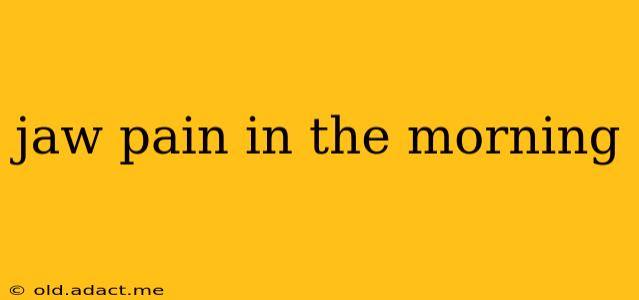Waking up with jaw pain can be incredibly frustrating and disruptive to your day. This common ailment can stem from a variety of sources, ranging from simple muscle strain to more serious underlying conditions. Understanding the potential causes, effective remedies, and when professional help is necessary is crucial for managing and resolving this issue. This comprehensive guide will explore the various aspects of morning jaw pain, providing you with the information you need to take control of your oral health.
What Causes Jaw Pain in the Morning?
Morning jaw pain often arises from activities or conditions that affect the temporomandibular joint (TMJ), the hinge connecting your jaw to your skull. Several factors can contribute to this pain:
-
Teeth Grinding (Bruxism): This unconscious habit, often occurring during sleep, puts significant stress on the jaw muscles and TMJ, leading to morning soreness. Stress and anxiety are often linked to bruxism.
-
TMJ Disorders (TMD): These encompass a range of conditions affecting the TMJ, including inflammation, misalignment, and cartilage damage. Symptoms can vary widely, but morning jaw stiffness and pain are common.
-
Sleep Position: Sleeping on your stomach or side can strain your jaw muscles and contribute to morning discomfort.
-
Stress and Anxiety: As mentioned above, psychological stress can manifest physically through muscle tension, including in the jaw.
-
Arthritis: Osteoarthritis or rheumatoid arthritis can affect the TMJ, causing pain and inflammation.
-
Injury: A recent injury to the jaw, face, or head can result in lingering pain that’s particularly noticeable in the morning.
-
Infection: An infection in or around the jaw, such as an abscess, can cause significant pain that worsens overnight.
What Are the Symptoms of Jaw Pain in the Morning?
Morning jaw pain can present in various ways, and recognizing these symptoms is vital for proper diagnosis and treatment:
- Stiffness: Difficulty opening or closing your mouth fully.
- Aching: A dull, persistent pain in the jaw area.
- Sharp Pain: Sudden, intense pain when chewing or moving the jaw.
- Headaches: Jaw pain often accompanies headaches, particularly those located in the temples or behind the eyes.
- Earaches: Pain radiating to the ears is another possible symptom.
- Clicking or Popping: Sounds emanating from the TMJ upon opening or closing the mouth.
How Can I Treat Jaw Pain in the Morning?
Numerous approaches can effectively address morning jaw pain, depending on the underlying cause:
-
Over-the-counter pain relievers: Ibuprofen or acetaminophen can help manage pain and inflammation.
-
Heat or Cold Packs: Applying warm or cold compresses to the jaw can provide temporary relief. Experiment to see which works best for you.
-
Gentle Jaw Exercises: Specific exercises can strengthen jaw muscles and improve TMJ function. Consult a physical therapist or dentist specializing in TMJ disorders for guidance on appropriate exercises.
-
Stress Management Techniques: Practicing relaxation techniques such as yoga, meditation, or deep breathing can help reduce stress-related jaw tension.
-
Mouth Guard: A custom-fitted mouth guard can prevent teeth grinding and protect the TMJ during sleep.
What if My Jaw Pain Persists?
If your morning jaw pain is severe, persistent, or accompanied by other concerning symptoms, it's crucial to seek professional help. A dentist or physician can properly diagnose the underlying cause and recommend the most appropriate treatment.
Can Jaw Pain Be a Sign of a Serious Problem?
While often benign, persistent jaw pain can sometimes indicate more serious conditions like TMJ disorders, arthritis, or infection. Therefore, persistent or worsening pain warrants a medical evaluation.
How Can I Prevent Jaw Pain in the Morning?
Prevention is key! Consider these steps to minimize your risk of developing morning jaw pain:
- Manage Stress: Implement stress-reducing strategies into your daily routine.
- Improve Sleep Posture: Try to sleep on your back to reduce strain on your jaw.
- Avoid Chewing Gum Excessively: Excessive chewing can put extra strain on the jaw muscles.
- Maintain Good Oral Hygiene: Regular dental checkups and good oral hygiene habits are essential.
When Should I See a Doctor or Dentist?
Consult a healthcare professional if your jaw pain is severe, doesn't improve with home remedies, is accompanied by other symptoms (fever, swelling), or if you suspect a possible injury. Early intervention can often prevent more significant complications.
This information is for general knowledge and does not constitute medical advice. Always consult with a qualified healthcare professional for diagnosis and treatment of any medical condition.
